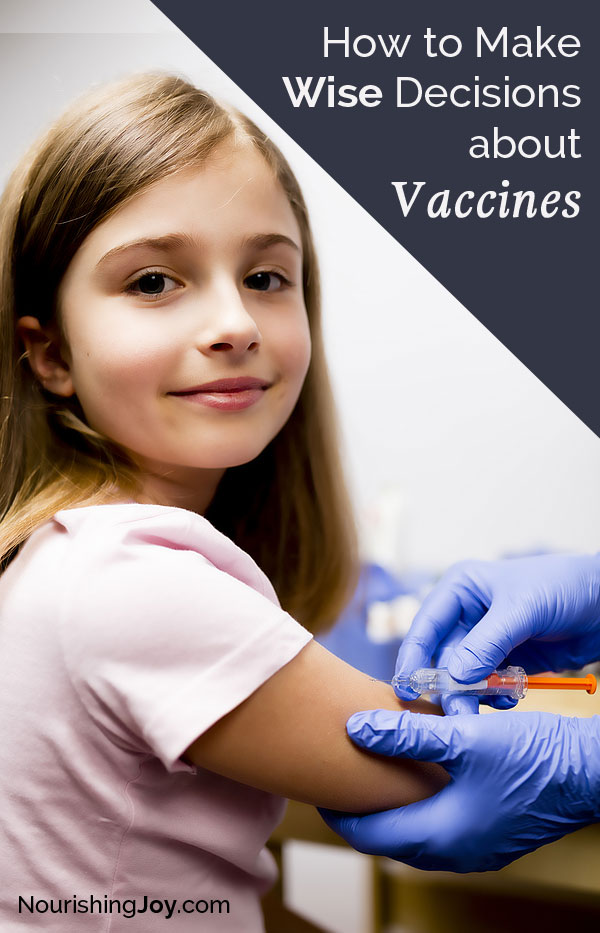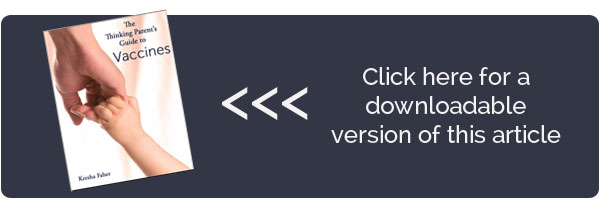

When my first child was born, I didn’t blink an eye at the large schedule of vaccinations awaiting her.
We showed up exactly on time for every appointment and carefully checked off every single shot.
But then, I ran across a reference to the fact that one of the injections she had just received included aborted human fetal tissue. I was sickened. Could that possibly be true?
I opened up her vaccination record book and counted through the 31 injections she had received – was it possible that she had the genetic cells of 31 other people in her?
It was that question – whatever the answer – that propelled me to seek out every piece of vaccination information I could get my hands on.
(Spoiler: There are currently 24 vaccines that are grown in human fetal tissue, although not all of those are given to children during routine vaccination.)
Why Vaccination Matters
Disease is real – and can be serious. But it's also important to keep in mind that there are two different types of disease.
Illnesses such as the common cold, most stomach viruses, and similar viruses are diseases that the body fights off with proper rest and nutrition, provided you are an otherwise healthy individual.
However, chronic or acute disease is such that the body cannot fight it off without outside help, whether that's in the form of antibiotics, vaccines, or other forms of treatment.
It is absolutely essential that our bodies build up immunity to these chronic diseases and that our immune systems are vigorous and strong (though not overly so, as we see with auto-immune diseases where an overly zealous immune system attacks itself). Proper rest and nutrition are crucial to this, but so is building and establishing immunity.
This is where the crux of the vaccination debate lies – do we best establish immunity through natural means (that is, exposing ourselves or our children to the disease) or through specialized, manufactured ones, namely the modern vaccine?
UPDATE February 2015: If vaccines are the way to go, the next logical question is Should they be mandatory? My colleague, Heather over at Mommypotamus, has written an outstanding article responding to this question.
So, let's take a look at a very brief overview of what the advocates of each approach claim, then consider a few decision-making strategies, and finally look at things to keep in mind for each choice.
To Vaccinate or Not to Vaccinate?
Arguments FOR Vaccination
Those who support mandatory vaccination cite the following reasons as why it's important to vaccinate children fully and on-time:
- Childhood diseases can be devastating or fatal, but they can be controlled or eliminated with vaccines, provided that all children are vaccinated.
- Since serious disease can be debilitating or fatal, the benefits of vaccination greatly outweigh the risks associated with vaccines.
- Widespread vaccination programs have nearly eliminated the common childhood diseases from the US.
- The timing of each vaccine is crucial and intentional – vaccines are purposely administered to newborns to counteract the waning of antibodies the baby inherited from the mother in vitro.
- Those who do not vaccinate their children are putting the entire society at risk for the sake of their own children.
Arguments AGAINST Vaccination
Those who desire to avoid vaccination cite these rationale:
- The risks associated with vaccines are real, which include toxic mercury and heavy metal exposure, genetically modified particles in the vaccines, contracting the vaccinated disease, and vaccine injury including neurological and autism spectrum disorders. While there has not been extensive research recorded to prove those risks, proponents cite that the anecdotal evidence is mounting at undeniable rates.
- Traditional vaccines are given via injection, which introduces a disease into the body in an unnatural fashion. For example, influenza naturally enters the body through the mouth, nose, ears, or eyes and by and large is a respiratory mucosal infection, but the vaccine introduces the disease directly into the bloodstream.
- In the US and Canada, the recommended vaccination schedule begins at birth or shortly thereafter. Anti-vaccination supporters claim that it is unjustifiable to expose a baby under 1-2 years of age to any vaccine risk, since the baby's immature nervous system, immune system, and brain are at such critical times of growth. They also argue that it's “too much too soon”. As of 2012, there are 38 vaccinations recommended in the first six years, as compared to 10 recommended vaccinations in 1983. (And according to the Pharmaceutical Research and Manufacturers of America, American biopharmaceutical companies are currently developing nearly 300 new vaccines to bring to the market, so this number will likely continue to increase.)
- There is conflict of interest on the part of the pharmaceutical companies that manufacture and market the vaccines, according to the New York Times and NaturalNews.com. Anti-vaccination advocates often state that information provided by these companies cannot be trusted to be for the good of the child.
- Anti-vaccination proponents argue that a child of any age should not be exposed to more than 1 disease at a time. For example, the DTaP-IPV shot – which is given three times in the first six months, then twice more before the age of 5 – includes diptheria, tetanus, pertussis, and polio all in one vaccine. (Source: Health Canada) See more on this PDF from the National Vaccine Information Center.
- It is too simplistic to say that vaccinations alone reduced or eliminated certain childhood diseases from the US. Clean water, improved hygiene, and urban sanitation systems have also played a significant role in ousting polio, smallpox, and other diseases from our midst. Dr. Howard Morningstar, MD, states: “I would rather use the long-term, tried-and-true ways to prevent epidemics— sanitation, nutrition, hygiene, health-awareness—and save the emergency measures, like mass vaccinations, for true emergencies.” (Source: “Vaccine Debate,” Mothering Magazine, July-August 2009, pg 51)
- There are too many ethical questions about what manufacturers use to produce and preserve vaccines – aborted fetal tissue, green monkey kidney tissue, and genetically modified human tissue are all used today in various vaccines for culturing and stabilizing the product.
How to Decide
So, in the midst of all the torrents of information available, how do you go about deciding what will work best for you and your child?
First, know that you have alternatives. Contrary to common belief, you have options when it comes to deciding how and when to vaccinate – it's not an all-or-nothing proposition. More about that in a minute…
Second, take the time to examine each vaccine carefully and decide whether it's right for your child and your community at this point in time. Feel free to use our Vaccine Evaluation Worksheet!
The Options:
Follow the full vaccination schedule according to the recommended schedule in your country. In this United States, see the current schedule at the US Department of Health and Human Services. In Canada, visit the Public Health Agency of Canada.
Delay vaccinations – Dr. Donald Miller, Dr. Robert Sears, and other physicians recommend starting vaccines at age 2 rather than at birth or in the first few months of life. Here's a look at the schedule Dr. Miller recommends.
Vaccinate against one disease at a time – Another alternative therapy is to vaccinate against only one disease at a time. For example, in the current standard schedule, a 2-month-old baby receives four injections vaccinating against 7 diseases in one visit, which can overload the immature immune system. An alternative schedule would introduce only 1 disease every 6 months.
Homeopathic vaccinations – Homeopathy is all about stimulating the body to build its own defenses. Homeopathic nosodes are highly effective and can be used at any age. Some practitioners advocate that homeopathic treatment be used only in the case of an epidemic or for travel, but they can also be applied as routine prophylaxis as well. (source)
Request the preservative-free version of each vaccine – There are preservative-free versions available for most vaccines, which will help you avoid mercury and other toxic substances in your injections.
Know what's legal where you live – Each state in the US has different laws about vaccine exemptions and what the ramifications are for not vaccinating. Educate yourself on local law as part of your decision-making process and you'll be well prepared to talk rationally with health care professionals, school officials, and other members of the community.
Cancel the appointment if there's any sign of illness – A person of any age – but especially children – need a fully healthy immune system to handle a vaccine. If your child has the sniffles, is unusually fussy or cranky, or has been ill in the last 2 weeks, cancel the appointment. If complications are going to happen following a vaccine, it will be because the immune system can't keep up, so give your child the best chance possible to build healthy antibodies and fight off infection.
Free Downloadable Vaccine Worksheet
It is often helpful to put into writing all the information related to each particular vaccine in light of each child.
- Since vaccines are immuno-stimulants and many are created with allergenic materials (e.g. eggs), you may come up with different decisions for different children according to their needs and overall health.
- Putting things into writing can also help you revisit each decision years down the road as you re-evaluate for a new child or if you've decided to delay a certain vaccination and need to re-think its timing.
- If you have ethical issues with any ingredients, writing down the entire list in each vaccine can help you spot those ingredients you find questionable.
Tip: Don't feel that you have to fill in an answer for EVERY question – just fill it out as much as you're able and you'll still have a good overview from which to base your decisions.
Resources
If you know of a resource that's not listed here, please add it in the comments!
FILM:
“The Greater Good” movie – watch the trailer in our post on 7 Must-See Documentaries for Intentional Living
ORGANIZATIONS:
USEFUL RESOURCES:
Printable Forms: Vaccination Exemption, Informed Consent, Affadavits, etc. – This is an incredibly useful resource!
Vaccine Ingredient Lists (plus MUCH MUCH more) from the Centers for Disease Control
Vaccine Ingredient Lists – from The Institute of Vaccine Safety at John Hopkins-Bloomberg School of Public Health – this is an excellent list of vaccines by brand-name, which you click on to read the ingredients and further info
Exemption Laws by State from GenerationRescue.org
Boost Your Child's Immune System by Dr. Bob Sears
A User-Friendly Vaccination Schedule by Dr. Donald W. Miller Jr.
ARTICLES:
Human Fetal Links in Some Vaccines – Immunization for Public Health
“Our 5 Part Plan for Vaccinations and How Do School Exemptions Work?” – from Kelly the Kitchen Kop
The Medical Effects of Using Human DNA in Vaccines and the Ethics of Using Aborted Fetal Tissue – Dr. Joseph Mercola
“The Emergence of Vaccine-Induced Diseases” – Dr. Joseph Mercola
“Are You Concerned Over Genetically Modified Vaccines?” – Dr. Joseph Mercola
“The Danger of Excessive Vaccination During Brain Development” (PDF link) by Dr. Russel L. Blaylock
BOOKS:
Viruses, Plagues, and History by Michael B. A. Oldstone
The Vaccine Book by Dr. Robert W. Sears, MD, FAAP
The Parents' Concise Guide to Childhood Vaccinations by Lauren Feder, MD – This is an especially excellent guide to pro and con arguments, vaccine ingredients, and practical ways to protect your children whether you choose to vaccinate or not
Make an Informed Vaccine Decision for the Health of Your Child: A Parent's Guide to Childhood Shots by Dr. Mayer Eisenstein
Common Sense Guide to Vaccines a
Original article and pictures take nourishingjoy.com site
Комментариев нет:
Отправить комментарий